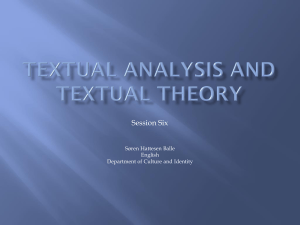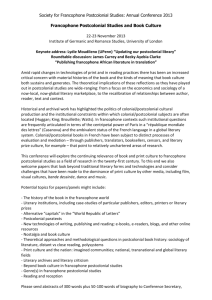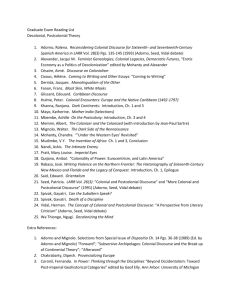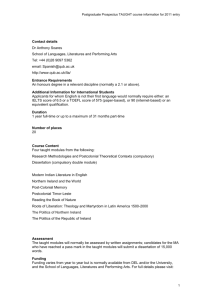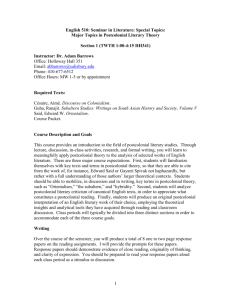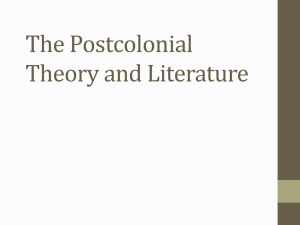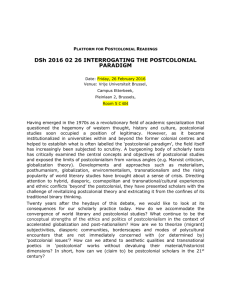CHAPTER2 THEORETICAL FRAMEWORK In this chapter, the writer
advertisement
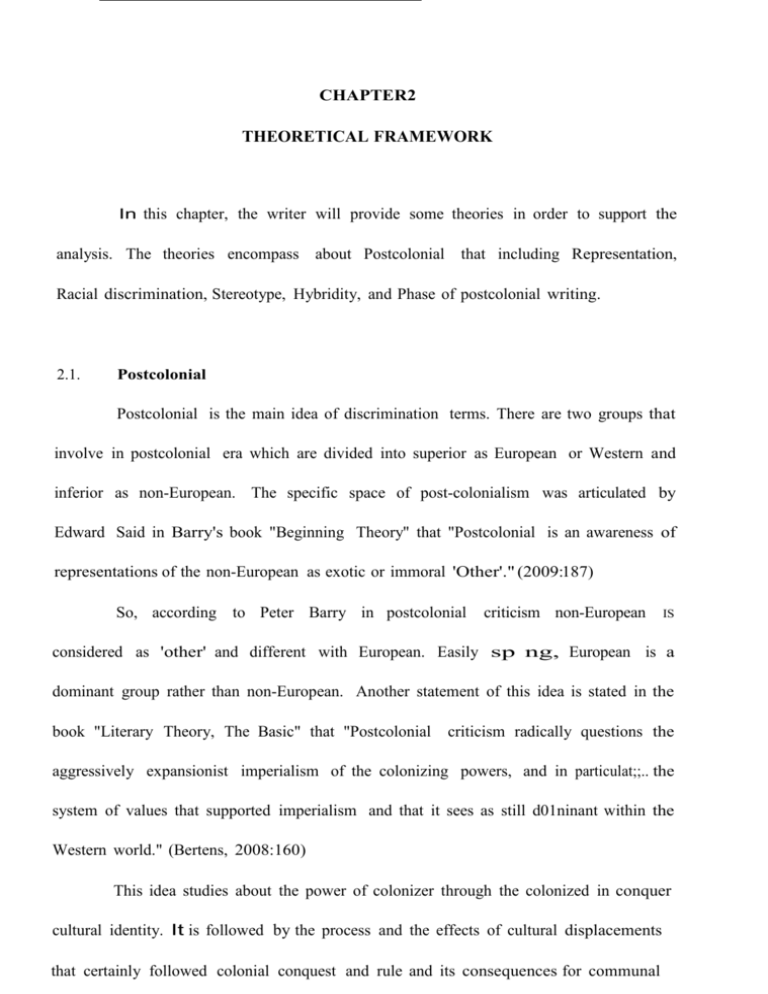
CHAPTER2 THEORETICAL FRAMEWORK In this chapter, the writer will provide some theories in order to support the analysis. The theories encompass about Postcolonial that including Representation, Racial discrimination, Stereotype, Hybridity, and Phase of postcolonial writing. 2.1. Postcolonial Postcolonial is the main idea of discrimination terms. There are two groups that involve in postcolonial era which are divided into superior as European or Western and inferior as non-European. The specific space of post-colonialism was articulated by Edward Said in Barry's book "Beginning Theory'' that "Postcolonial is an awareness of representations of the non-European as exotic or immoral 'Other'." (2009:187) So, according to Peter Barry in postcolonial criticism non-European IS considered as 'other' and different with European. Easily sp ng, European is a dominant group rather than non-European. Another statement of this idea is stated in the book "Literary Theory, The Basic" that "Postcolonial criticism radically questions the aggressively expansionist imperialism of the colonizing powers, and in particulat;;.. the system of values that supported imperialism and that it sees as still d01ninant within the Western world." (Bertens, 2008:160) This idea studies about the power of colonizer through the colonized in conquer cultural identity. It is followed by the process and the effects of cultural displacements that certainly followed colonial conquest and rule and its consequences for communal 7 From literature study, it is stated in Barry's book the purpose of postcolonial criticism. "One significant effect of postcolonial criticism is to further undermine the universalist claims once made on behalf of literature by liberal humanist critics. If we claim that great literature has a timeless and universal significance we thereby demote or disregard cultural, social, regional, and national differences in experience and outlook, preferring instead to judge all literature by a single, supposedly 'universal', standard." (2009:185) The statement above means that marginal literary works can never be as good as the universal literary works. In other words, only great literature can be more universal and timeless rather than the marginal one because of cultural, social, regional, and national differences. Fanon argued that "The first step for 'colonialised' people in finding a voice and an identity is to reclaim their own past." (Barry, 2009:186) It is stated that both black and white people wilJ have been taught to see history, culture, and progress as beginning with the arrival of the Europeans. So, the first step of postcolonial perspective is to reclaim the nation's past and the second is to erase step by step the colonialist ideology. In "Postcolonial Revisited: Writing Wales in English by Kirsti Bohata stated about postcolonial study. "Postcolonial studies encompass history, economics, colonial and imperial discourses, the condition of colonized peoples, strategies of decolonization, and so on; literary criticism directly engaged with post-colonial writing in any language, but most commonly in a European language; and revisionist projects which force a reassessment of the literature of colonialism and the metropolitan 'centre'." (2004:2) 8 Postcolonial study has been viewed as a problematic thing deals with colonizer and colonized people. In the literary criticism, postcolonial writing also involved in any language to the literary works but commonly in a European language. 2.2. Representation Representation theory is a part of postcolonial criticism. In the book "Representation: Cultural Representations and Signifying Practices" by Stuart Hall it is explained that "Representation means using language to say something meaningful about, or to represent, the world meaningfully, to other people." (2003:IS) The concept of representation is to connect meaning and language in the study of culture. This concept can help people about how language is used to represent the world through the theory. In the cultural study, it can be used to represent or to symbolize something and to stand for other people about concepts, ideas, and feelings. This theory can help people to give meaning to things through language and make people able to express a complex thought about things to other people. When people talk about representation, 'other' is used to represent 'difference' in popular culture today. However, 'other' and 'difference' are related. Questions of 'difference' have come to the front in cultural studies in recent decades and been addressed in different ways. It is said by Hall that "Representation is a complex business and, especially when dealing with 'difference', it engages feelings, attitudes, and emotions and it mobilizes fears and anxieties in the viewer, at deeper level than we can explain in a simple, common-sense way." (2003:226) 9 Through Hall's statement, representation is aimed to deepen the understanding and the analysis about 'difference'. In the terms of 'difference' feelings and emotions are related in non-white people so that is why this theory is needed. It can help to learn about how representation signifies practice and continues to develop the concept to explain the operations. In the representation of non-white, there are positive and negative images of non-white people in life and culture. Related to those images, there is a statement in binary opposition positively 'Black is beautiful', it shows that non-white people are accepted but still different. It aims to create a positive identification. However, 'being black' is represented, but not displace the negative. (2003:272-3) 2.3. Racial discrimination Since the eighteenth century, the concept of race has played a central role in the construction of the idea of national character, and for a second group of thinkers race is not simply an 'imaginary'. "Racial discrimination is a theme that runs throughout postcolonial discourse, as white Europeans consistently emphasized their superiority over darkerskinned people. This is most evident in South Africa, whose policy of apartheid is institutionalized in national laws. These laws included the Prohibition of Mixed Marriages Act and the Immorality Act, which prohibited sexual intercourse and marriage between whites and blacks. The Groups Areas Act limited black access into areas reserved for whites. The only blacks permitted in these areas were workers, who first had to apply for state permission. The Population Registration Act categorized Africans into racial groups, which were based upon a person's appearance, education, and manners." (http://www.bookrags.com/studyguide-postcolonialism/themes.html) 10 The white people show their superiority over the non-white throughout postcolonial discourse. The non-white is always considered as 'other' in society. In the sexual intercourse, there is a law stated that interaction between the white and the nonwhite is prohibited. It is clearly shown that racial discrimination is existed. In the field of work, the non-white treated differently, they can't have same occupation without applying state permission. The non-white was also classified into racial group which is based on their appearance, education, and manners. Stuart Hall in his book "Representation: Cultural Representations and Signifying Practices" said that racial 'difference' tended to cluster two main themes. First is the subordinate status and 'innate laziness' of blacks which means that they are 'naturally' born to be a slave and at the same time they are stubbornly unwilling to work in appropriate ways, so it makes profitable for their masters. The second is innate 'primitivism' which means lack of culture and made them genetically incapable of 'civilized' refinements. (2003:244) In the concept of race, there are some differences about this theory which is conceived as discrete and homogenous. Theory of race is posited from biology, geography, and climatic conditions looks from the differences of physical appearance, culture, and historical experience. Race has played a central role of how white racist society treated black differently. Patricia Waugh in her book "An Oxford Guide Literary Theory and Criticism" explained about: "The Negro race in particular was thought to be incapable of contributing effectively to the intellectual progress of civilization, though there were plenty of examples, despite their enslaved condition, of black people writing their race into the developing concept of nation" (Waugh, 2006:371) 11 In the sentences above, black people were an object of the oppression from the past until now. White people often think everything that associated with black people are not good for the future or in other words they are incapable. For example, in the past they could only work as a slaves but in a real life they still wanted to be accepted and treated well by the white people. In the book ''Key Concepts in Literary Theory" by Julian Wolfreys, Ruth Robbins, and Kenneth Womack, it is explained that: "Race has become a trope of ultimate, irreducible difference between cultures, linguistic groups, or adherents of specific belief systems'. Thus, as a discursive, political and ideological term, race functions frequently as a means of definition based on binary oppositions between self and other, civilised and savage, and so on." (2006:82) · Race has become the key of how people are differentiated in culture and group. Definition ofrace can be described through the binary opposition. From the explanation above, self and other shows that there is majority considered as self and minority is considered as 'other' in society. Likewise, the civilized and savage describe the whites are people while the non-whites are 'something else'. 2.4. Stereotyping In postcolonial study, stereotype is used to represent the minority as 'difference' and 'other' from the majority. In "Representation: Cultural Representations and SignifYing Practices", Stuart Hall said that "People who are significantly different from the majority are exposed to a binary fort;11 of representation such as good/bad, civilized/primitive, ugly/excessively attractive, repelling because differtlntlcompelling because strange and exotic." (2003:229) 12 According to Hall, the majority and the minority people cannot have the same treatment so there is a binary form or a pair which is contrasted to a word of representation to show the difference. When talking about the majority, the white are always considered good in every perspective while the minority is always become the bad. It is because the non-white stereotype which is created by the white. Even though black people are shown at the top of their achievement, they are still considered fail to carry it off. For example is Linford Christie, the non-white who becomes a captain of the British Olympics squad because he won the Olympic gold medal in Barcelona. But all of the perspective is not about the people and the occasion but about the 'other' or 'difference'. Stereotyping of people also can be seen from physical differences which is white people and non-white people. It is said that "Black people were reduced to the signifiers of their physical difference-thick lips, fuzzy hair, broad face and nose, and so on." (2003:249) This figure has reduced black people to a few simplified, reductive, and essentialized features. So, it can be said that stereotyping try to get hold the characteristics of a person, reduce everything about the person from its traits and fix the condition without change or development. However, stereotype of people can make them considered to be the same or become 'othe't' in society. In his book, Hall said that "Stereotype tends to occur where there are gross inequalitie Qf power." (2003:258) Power is usually the determiner of how people are considered as superior in a group. This thing is directed to the subordinate or inferior group because pow:eris sort of a game where it classifies people according to a norm and crel\tes the inferlbrM 'other' in society. 14 Stereotype is an explanation about representation of certain characters in literary works that related to racianational and social groups. 2.5. Hybridity Related to postcolonial study, hybridity possibly happens as the result of colonial encounter between colonizer and colonized. Hans Bertens in his book "Literary Theory : The Basics" quoted Bhabha: "The cultural interaction of colonizer and colonized leads to a fusion of cultural forms that from one perspective, because it signals its 'productivity', confirms the power of the colonial presence, but that as a form of mimicry simultaneously 'unsettles the mimetic or narcissistic demands of colonial power." (2008:167) Bhabha assumes that hybridity not only to indicate the blend of cultural interaction but to represent the unpredictability of its presence. Bhabha focuses on the interaction and his belief of hybridity to explain about what actually happens or may happen in the colonial and postcolonial situation. Another explanation about hybridity is stated by Raman Selden, Peter Widdowson, and Peter Brooker in their book "A Reader's Guide to contemporary Literary Theory". "Hybridity is an enabling metaphor which assists theorization of the 'black experience' as a 'diaspora experience' (both in Britain and the Caribbean) and brings to the fore the doubleness or double-voiced structures which he sees as constitutive of this experience". (2005:231) Hall's analysis of black diaspora cultural experience and the concept metaphor of hybridity both to indicate the complexity of the presence or absence of the non West 14 and to highlight the dialogue of power and resistance, of refusal and acknowledgment 15 against the dominance of European cultures. The diaspora experience is defined not by purity, but heterogeneity and variety of identity. Selden, Widdowson and Brooker quoted Bhabha about what is hybridity. "Bhabha sees hybridity as a 'problematic of colonial representation' which 'reverses the effects of the colonialist disowal [of difference], so that other "denied" knowledges enter upon the dominant discourse and estrange the basis of its authority" (2005:229) Bhabha said that hybridity is not simple in the colonial representation because production of hybridization expresses the condition possibility of counter-colonial resistance. of colonial enunciation and This condition will provoke mix cultured between the West and the non-West which means the non-West as a minority have to be equal with the West. In ''Postcolonialism: A Very Short Introduction", Hybridity is explained in general meaning. "Hybridity works in different ways at the same time, according to the cultural, economic, and political demands of specific situations. It involves processes of interaction that create new social spaces to which new meanings are given. These relations enable the articulation of experiences of change in societies splintered by modernity, and they facilitate consequent demands for social transformation." (Young, 2003:79) Hybridity has different ways in certain situations. It creates process of new interactions and new meanings in social places. From the relation of the interaction, it enables the experiences of changes in society. There will be also social transformation in the society. 16 2.6. Phase of postcolonial writing According to postcolonial literary works, an author has an important part. There are three levels of how postcolonial writing is seen in the literary works which are Adopt, Adapt, and Adept. 2.6.1. Adopt In adopt phase of postcolonial literature, Peter Barry in his book "Beginning Theory'' stated that "The writer's ambition is to adopt the form as it stands, the assumption being that it has universal validity". (2009:190) In this phase, all postcolonial writers begin their ambition of writing works with an unquestioning acceptance using all the form of European model. Postcolonial criticism plays role as its main subject matter of white representations of colonial countries. 2.6.2. Adapt The second phase is called Adapt. "This phase aims to adapt the European form to African subject matter, thus assuming partial rights of intervention in the genre."(2009:190) In this phase, postcolonial criticism makes new explorations by postcolonial writers. All about diversity, hybridity and every difference become central. All The writers of postcolonial era put themselves not only in one ideology but in both ideologies which are the European and the non-European. They try to create a negotiation between the two ideologies in literary works. 17 2.6.3. Adept The third phase of this theory is called Adept. In this phase, a declaration of cultural independence the non-European writers remake the form to their own characteristic and specification without any reference from the European. All the writers put themselves in the non-European ideology. (2009:189)
